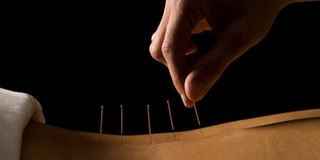Using acupuncture to treat bell’s palsy

Research has suggested that acupuncture and physical therapies, such as facial exercises and massage, may be beneficial for Bell's palsy. Photo/AFP
Bell's palsy is a condition that causes paralysis on one side of your face. The symptoms usually come on suddenly but have no obvious cause. Most people make a full recovery.
Bell's palsy is caused by damage to your facial nerve, causing weakness to the muscles on one side of your face. Bell's palsy is the most common cause of facial paralysis worldwide, affecting up to three in 10,000 people.
Bell's palsy is named after Sir Charles Bell, a nineteenth-century doctor who first described the condition and linked it to a problem with the facial nerve.
Symptoms of Bell's palsy
The symptoms of Bell's palsy usually come on suddenly, often within a few hours or overnight, and are at their worst within two days.
The main symptom is that one side of your face becomes weak or paralysed. Symptoms can range from mild to complete paralysis. You may find that on the affected side of your face:
• your eye is difficult to close and you find it hard to blink
• your eye is very watery or very dry
• your eyebrow sags
• the corner of your mouth droops, causing saliva and drinks to dribble from your mouth
Other symptoms may include the following.
• Pain or discomfort around your jaw and behind your ear. It may feel like you have just had treatment at the dentist.
• A ringing noise in one or both of your ears.
• Being unable to taste at the front of your tongue.
• Difficulties with speaking and eating.
When you smile, you may notice that the affected side of your face appears expressionless, because your muscles are unable to move.
These symptoms may be caused by problems other than Bell's palsy, but if you have them, see a doctor immediately for advice.
Complications of Bell's palsy
About three-quarters of people with Bell's palsy recover completely. However, if your symptoms don't improve within three to six months, you may find that:
• your eye dries out and forms an ulcer – this can become infected and may leave a scar on your cornea (the clear surface of your eye)
• the muscles in your face continue to feel tight and weak
• you have spontaneous twitches or spasms in your face muscles (also known as synkinesis)
• you appear to cry when you’re eating because saliva is misdirected from your saliva glands to your tear gland (sometimes called crocodile tears)
If you have Bell’s palsy after the age of 60, you may not recover as quickly or as fully.
Causes of Bell's palsy
The symptoms of Bell's palsy occur when the nerve that controls the muscles in your face becomes inflamed or compressed.
The exact cause of Bell’s palsy isn’t known, but the herpes simplex virus, which causes cold sores, may be associated with the condition. If the virus causes infection near your facial nerve, it can become swollen and inflamed.
You may be more likely to develop Bell's palsy if you have diabetes or are pregnant, although the reasons for this aren’t known.
Diagnosis of Bell's palsy
Your doctor will ask about your symptoms and examine you. It's usually possible to diagnose Bell's palsy by looking at how your face is affected on one side.
Your doctor may refer you to a neurologist (a doctor who specialises in identifying and treating conditions that affect your nervous system, including the brain) or an ear, nose and throat (ENT) specialist. You may also need to see an ophthalmologist (a doctor who specialises in identifying and treating eye conditions) to treat any complications in your eye.
Treatment of Bell's palsy
For most people, Bell's palsy gets better by itself without any treatment. Symptoms usually start to improve within three weeks. Almost all people make a complete recovery within six months.
If your condition is mild, your doctor will usually recommend you take some self-help measures to help you recover. You may, however, need medicines or surgery if your condition is longer term or more severe.
Self-help
If you have Bell's palsy, you may find it difficult to blink and close your eyelid. This means that the surface of your eye could be at risk of drying out. You can keep your eye moist by using:
• lubricating eye drops, such as artificial tears, eye ointments or eye gels to stop your cornea from drying out
• a transparent eye shield to protect your eye during the day
• tape to keep your eye closed before you go to sleep
Always read the patient information leaflet that comes with these products and if you have any questions, ask your chemist (pharmacist) for advice.
If your eye becomes red or painful, or your vision becomes blurred, then it’s important to see your doctor urgently as there may be a scratch on the surface of your eye which could become infected.
You should also stay away from playing ball sports that may injure your affected eye.
Medicines
Your doctor may prescribe you a steroid, such as prednisolone, to reduce the inflammation in your facial nerve. If you have this treatment within three days of your symptoms starting, you're more likely to recover. You will usually need to take the tablets for 10 days.
Always ask your doctor for advice and read the patient information leaflet that comes with your medicine.
Complementary therapies
Research has suggested that acupuncture and physical therapies, such as facial exercises and massage, may be beneficial for Bell's palsy. However, more research is needed to confirm whether these treatments are effective.
Surgery
If your symptoms don't go away after six to nine months, by themselves or with medical treatment, cosmetic or reconstructive surgery may be an option. For example, your doctor may refer you for treatment if your eyelid doesn't fully close or your smile is crooked. Speak to your doctor for more advice.
Availability and use of different treatments may vary from country to country. Ask your doctor for advice on your treatment options.


